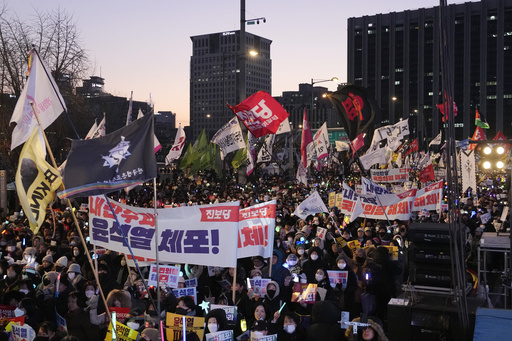SEOUL, South Korea — Following several weeks of isolation in a fortified residence, the ousted South Korean President Yoon Suk Yeol has been apprehended by hundreds of police and anti-corruption officials for questioning regarding his recent declaration of martial law.
Tensions escalated during an earlier attempt on January 3 to detain him, where presidential security forces, alongside military units and barricades, thwarted dozens of investigators from entering the compound.
However, after negotiations between Yoon’s legal representatives and officials, he was taken from the residence on Wednesday for questioning by the anti-corruption agency.
This series of events follows Yoon’s surprising choice to enforce martial law amid a political standoff with the opposition, which holds a significant majority in the National Assembly.
**Current Developments**
The Corruption Investigation Office for High-Ranking Officials revealed that Yoon was taken into custody approximately three hours after a large contingent of law enforcement officers breached the residential compound without facing much resistance.
A convoy of black SUVs, some with sirens activated, departed from the presidential grounds under police escort. Yoon was later seen exiting a vehicle upon arrival at the anti-corruption agency’s facility in the nearby city of Gwacheon.
In a recorded video message before his detention, Yoon expressed his beliefs that the “rule of law has completely collapsed in this country.”
Officials are looking into whether Yoon’s brief consolidation of power on December 3 could be classified as an attempted rebellion. In South Korea, presidents enjoy substantial immunity from prosecution while in office except in cases concerning rebellion or treason.
**Background of the Standoff**
Yoon’s declaration of martial law stemmed from accusations that the liberal opposition was using its legislative power to obstruct his governmental agenda. Following his announcement, he deployed military personnel to encircle the National Assembly, yet lawmakers managed to overcome this barrier and voted against it, leading to its repeal a few hours later by the Cabinet.
This unprecedented episode has deeply impacted the political, diplomatic, and financial landscape of South Korea, further revealing the country’s stark societal divisions. On December 14, Parliament moved to impeach Yoon and suspend his presidential duties.
Yoon has declared an intention to “fight to the end” against removal efforts.
**Leadership Transition**
In the wake of Yoon’s detention, Deputy Prime Minister Choi Sang-mok has stepped in as the acting president. In a plea for calm, Choi called on law enforcement and the presidential security detail to prevent any “physical clashes.”
Despite frustrations voiced by the anti-corruption agency regarding the presidential security service’s lack of cooperation, Choi accepted the resignation of Park Jong-joon, the head of the security detail, who had been questioned regarding the failed detention attempt on January 3. Park maintained that his role was to protect the president while ensuring the investigation respects presidential status and national dignity.
The National Assembly is currently under the control of the liberal opposition Democratic Party, which led the push for Yoon’s impeachment. Conversely, supporters from Yoon’s People Power Party have rallied near the presidential residence, denouncing the detention efforts as unlawful.
Significantly, several military leaders, including Yoon’s defense minister and police chief, have already faced arrest related to the martial law episode.
**Looking Ahead**
While Yoon undergoes questioning, officials are anticipated to seek a court’s approval for a formal arrest. Should this not occur, Yoon’s release would be mandated within 48 hours.
At the same time, the Constitutional Court convenes to address whether Yoon will officially be removed from office or restored to power. The court’s initial hearing took place on Tuesday, though it was notably brief as Yoon opted not to attend. The subsequent hearing is scheduled for Thursday, where the proceedings will continue regardless of Yoon’s presence.
Amidst these developments, tension persists in Seoul, as both supporters and adversaries of Yoon have held rival demonstrations outside the presidential residence. Each side firmly pledges their stance—one proclaiming protection of the president, while the other demands his removal. Thousands of police officers in yellow vests diligently oversee the charged atmosphere. Law enforcement has established barriers to separate the two groups, who have exchanged harsh words, with one individual arrested during a heated confrontation involving a box cutter, although no injuries were reported.
Yoon’s legal representation has raised concerns that images of the impeached president’s arrest could incite backlash from his base and potentially ignite a “civil war.”



